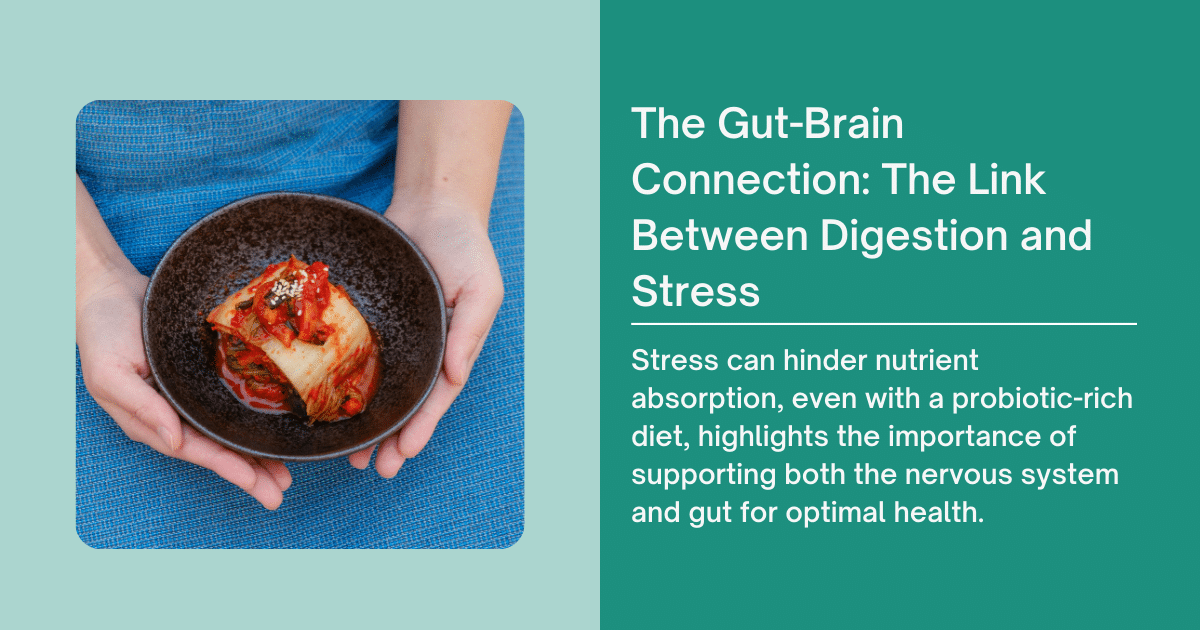the link between stress and digestion
By: Rebecca Roberts
Dr. Grundy shares here insight into the gut-brain connection, including 5 examples of ways our gut microbiome could be impacting our health. Industrialized, low in fiber, processed foods
- Overuse or improper use of antibiotics
- Increase Caesarian sections
- Decline in breast feeding
- Household sanitation
According to Dr. Grundy, to replenish our gut, we should only use antibiotics when prescribed by your physician, take probiotics, eat a diet high in fiber, eat complex carbs, consume less meat, limit saturated fats, eat more plant derived monounsaturard fats and consume beneficial microbes or probiotics. A microbiome is “the ecological community of commensal, a symbiotic and pathogenic microorganism that shape our body space. They are composed of bacteria, fungi, and viruses that outnumber our own cells ten to one.
This deep dive into the significance of the gut microbiome sets the stage for understanding the intricate gut-brain connection, an emerging player in the realm of health and disease. This connection underscores how closely our mental health and gastrointestinal health are intertwined, affecting each other in profound ways. The insights shared in Harvard Health’s article, “Pay attention to your gut-brain connection – it may contribute to your anxiety and digestion problems,” further illuminate the critical relationship between our emotional well-being and digestive system. It highlights the bidirectional communication between our gut and brain, showing that our psychological state can directly influence our gut health and vice versa, thus underscoring the importance of addressing both aspects to achieve overall well-being.
The concept of a “gut-wrenching” experience or feeling “nauseous” in certain situations is not just metaphorical language. These expressions are rooted in the biological reality of our body’s response to emotions, illustrating how feelings such as anxiety, sadness, or elation can trigger physical symptoms in the gut. The gastrointestinal tract, sensitive to emotion, is directly influenced by the brain, with the mere thought of eating stimulating stomach juices even before food arrives. This bidirectional communication means that distress in our intestines can signal the brain, just as a troubled mind can affect the gut. This intricate connection reveals that digestive issues can be both a cause and a product of psychological states like anxiety, stress, or depression, highlighting the relationship between the brain and the gastrointestinal system.
Given this connection, it’s not surprising that treatments aimed at reducing stress or addressing psychological factors like anxiety and depression can lead to significant improvements in digestive symptoms. This approach, backed by multiple studies, suggests that psychological interventions can complement conventional medical treatments, offering a more holistic strategy for managing functional gastrointestinal conditions.
Building on the premise that psychological well-being significantly impacts digestive health, the dialogue between the Enteric Nervous System (ENS) and the Central Nervous System (CNS) becomes crucially relevant. This two-way communication network, vital for our overall health, illustrates how the ENS—our gut’s autonomous “second brain”—and the CNS work in concert to regulate both digestion and emotional responses. This partnership explains why disturbances in our gut can affect our mood and stress levels and how our mental state can, in turn, influence gut health. Recognizing this interplay offers a compelling rationale for integrating psychological care with traditional gastrointestinal treatment, creating a comprehensive approach that addresses both the mind’s and the body’s needs.
This integrative perspective lays the groundwork for the subsequent discussion on the efficacy of treatments that bridge the gap between neurology and gastroenterology. This understanding of the ENS-CNS connection underscores the potential of treatments that target the brain-gut axis, such as antidepressants and mind-body therapies including cognitive behavioral therapy (CBT) and medical hypnotherapy, in managing IBS and bowel disorders. This dialogue suggests that therapeutic approaches benefiting one may offer relief to the other. Thus, gastroenterologists, in their role as healers of the digestive system, might also be viewed as mental health allies, deploying strategies to pacify our second brain.
According to John Hopkins, therapeutic approaches to stress, depression and anxiety have been proven to support gut health. In prescribing antidepressants for IBS, gastroenterologists recognize these medications’ dual role. Beyond their psychiatric applications, certain antidepressants can alleviate gut symptoms by engaging with neural pathways in the digestive tract. Similarly, psychological therapies like CBT offer a dual benefit, fostering healthier interactions between our cognitive and enteric systems. This holistic approach to treatment exemplifies the intricate interconnectedness of mind and body, emphasizing that interventions aimed at calming the mind may, in turn, soothe the gut.
Building on this foundation, research from institutions like Johns Hopkins University further explores the intricate dynamics of the mind-gut connection. It suggests the potential for discovering novel interventions that harness the symbiotic relationship between our gut and mental health. For instance, exploring the efficacy of integrated treatment plans that combine dietary modifications, probiotic supplementation, and tailored mental health strategies could offer comprehensive relief for individuals with IBS. Such an approach would not only address the physical symptoms but also the psychological stressors, creating a more robust framework for managing gut health.
The burgeoning field of neurogastroenterology, with significant contributions from Johns Hopkins University, offers promising insights into the mind-gut connection, highlighting the potential of interdisciplinary treatments that encompass both pharmacological and psychological therapies. As we delve deeper into this interconnectedness, it’s clear that our approach to gut health must evolve beyond traditional methods, adopting a more holistic perspective that recognizes the profound impact of mental well-being on digestive health, and vice versa. Encouraging patients to adopt strategies that promote both mental and gut health, including stress management techniques, mindfulness practices, and a balanced diet rich in probiotics, could significantly enhance treatment outcomes. This comprehensive approach not only acknowledges the complexity of the brain-gut axis but also empowers individuals to take an active role in their health.It’s clear that managing stress is just as crucial as dietary or medical strategies for supporting gut health. If you’re feeling stressed and experiencing digestive discomfort, simply focusing on gut health might not fully address the issue. To truly meet your health goals, reducing stress in your life is essential. Ignoring the impact of stress and emotional well-being can stand in the way of achieving the best health outcomes. Ffinding ways to lessen the stressors in our daily lives is key to a comprehensive health strategy, ensuring a balanced and healthy interplay between our mental and physical well-being.







